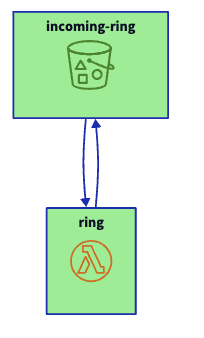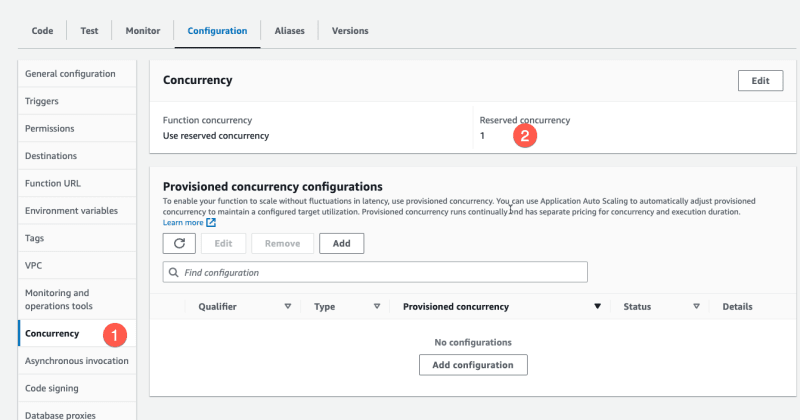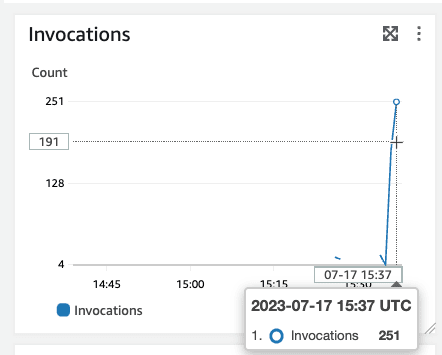Recursive loops in AWS Lambda are the root of all evil because you create a large bill quickly.
You might think the danger is over because of new AWS recursive loop detection. But what about S3 buckets and Lambda? It's time for a closer look:
A word of caution: Be very careful when you test this. You could create large AWS bills.
TL;DR: Never ever use the same bucket for invoking a Lambda and write the output.
Some testing infrastructure:
1) A S3 bucket (CDK, GO)
bucky := awss3.NewBucket(stack, aws.String("incoming-ring"), &awss3.BucketProps{
BlockPublicAccess: awss3.BlockPublicAccess_BLOCK_ALL(),
RemovalPolicy: awscdk.RemovalPolicy_DESTROY,
})
2) A Lambda Function Resource
ringFunction := awslambda.NewFunction(stack, aws.String("ring"),
&awslambda.FunctionProps{
Description: aws.String("ring - test recursive loop stop"),
FunctionName: aws.String("ring"),
LogRetention: awslogs.RetentionDays_THREE_MONTHS,
MemorySize: aws.Float64(1024),
Timeout: awscdk.Duration_Seconds(aws.Float64(10)),
Code: awslambda.Code_FromAsset(&lambdaPath, &awss3assets.AssetOptions{}),
Handler: aws.String("main"),
Runtime: awslambda.Runtime_GO_1_X(),
DeadLetterQueueEnabled: aws.Bool(true),
DeadLetterQueue: dlq,
})
3) A Lambda Function, which gets the PutObject Event and write to the same bucket:
someString := "hello world\nand hello go and more"
myReader := strings.NewReader(someString)
resp, err := client.PutObject(context.TODO(), &s3.PutObjectInput{
Bucket: aws.String(bucket),
Key: aws.String(s3input),
Body: myReader,
})
4) An event, which triggers the Lambda function each time an object is Put to the bucket:
myHandler.AddEventSource(event.NewS3EventSource(bucky, &event.S3EventSourceProps{
Events: &[]awss3.EventType{awss3.EventType_OBJECT_CREATED,},
}))
Now we have:
And because I am very careful, I decide to create a recursive loop stopper inside the Lambda function:
GlobalCounter++
if GlobalCounter > 20 {
log.Fatal("Counter exceeded\n")
os.Exit(1)
}
And in the Console, we set the concurrency to 1:
When we test the recursive loop, we always have a browser window with the concurrency open. Because: Setting the concurrency to 0 is the fastest way to stop an endless loop.
The test
Lets test whether S3-Lambda-S3 recursive loops are still possible:
We use saw to tail lambda log:
saw watch /aws/lambda/ring
And then start the recursive loop:
aws s3 cp README.md s3://ring-incomingring3eb9a9b9-1a8q8cp8qm2ch/readme1.md
upload: ./README.md to s3://ring-incomingring3eb9a9b9-1a8q8cp8qm2ch/readme1.md
Very fast you get the logs:
[2023-07-17T17:34:39+02:00] (2023/07/17/[$LATEST]e27ec4706f1a4fb0a6d3ca1fdb23bbc0) INIT_START Runtime Version: go:1.v18 Runtime Version ARN: arn:aws:lambda:eu-central-1::runtime:ccb68acb59818f9df9b10924cc6c83ca6eaf4067f70ba861c0e211b59e8af729
[2023-07-17T17:34:39+02:00] (2023/07/17/[$LATEST]e27ec4706f1a4fb0a6d3ca1fdb23bbc0) START RequestId: 10fba020-0e93-4430-a9d7-728d34b146c9 Version: $LATEST
[2023-07-17T17:34:39+02:00] (2023/07/17/[$LATEST]e27ec4706f1a4fb0a6d3ca1fdb23bbc0) Counter: 1
[2023-07-17T17:34:39+02:00] (2023/07/17/[$LATEST]e27ec4706f1a4fb0a6d3ca1fdb23bbc0) Etag: 446cce24a7c945503232494e881150ec
[2023-07-17T17:34:39+02:00] (2023/07/17/[$LATEST]e27ec4706f1a4fb0a6d3ca1fdb23bbc0) Seq: 0064B55F8E25E34383
[2023-07-17T17:34:39+02:00] (2023/07/17/[$LATEST]e27ec4706f1a4fb0a6d3ca1fdb23bbc0) END RequestId: 10fba020-0e93-4430-a9d7-728d34b146c9
[2023-07-17T17:34:39+02:00] (2023/07/17/[$LATEST]e27ec4706f1a4fb0a6d3ca1fdb23bbc0) REPORT RequestId: 10fba020-0e93-4430-a9d7-728d34b146c9 Duration: 92.67 ms Billed Duration: 93 ms Memory Size: 1024 MB Max Memory Used: 39 MB Init Duration: 110.22 ms
[2023-07-17T17:34:40+02:00] (2023/07/17/[$LATEST]e27ec4706f1a4fb0a6d3ca1fdb23bbc0) START RequestId: 97cf261e-b272-437f-9637-b7573cfb0fa8 Version: $LATEST
[2023-07-17T17:34:40+02:00] (2023/07/17/[$LATEST]e27ec4706f1a4fb0a6d3ca1fdb23bbc0) Counter: 2
[2023-07-17T17:34:40+02:00] (2023/07/17/[$LATEST]e27ec4706f1a4fb0a6d3ca1fdb23bbc0) Etag: a9c4c5f405a3e4cc6ba3b6b355da0e71
[2023-07-17T17:34:40+02:00] (2023/07/17/[$LATEST]e27ec4706f1a4fb0a6d3ca1fdb23bbc0) Seq: 0064B55F8FD24FBE14
[2023-07-17T17:34:41+02:00] (2023/07/17/[$LATEST]e27ec4706f1a4fb0a6d3ca1fdb23bbc0) END RequestId: 97cf261e-b272-437f-9637-b7573cfb0fa8
[2023-07-17T17:34:41+02:00] (2023/07/17/[$LATEST]e27ec4706f1a4fb0a6d3ca1fdb23bbc0) REPORT RequestId: 97cf261e-b272-437f-9637-b7573cfb0fa8 Duration: 27.20 ms Billed Duration: 28 ms Memory Size: 1024 MB Max Memory Used: 40 MB
The interesting part is:
Counter: 1
Counter: 2
...
Counter: 19
Counter: 20
Counter exceeded
And because AWS BLOG about recursive loops says:
"Lambda now detects the function running in a recursive loop between supported services after exceeding 16 invocations. It returns a RecursiveInvocationException to the caller."
We are now sure that the loop detection for S3 is not working because we counted to 20!
And although I implemented a loop stopper very fast, I started a recursive loop:
So now I set the concurrency to 0 again and delete the Lambda.
Summary
It's proven:
Recursive Loop detection does not stop S3 recursive loops, so do use different buckets for event trigger and Lambda output!
So be careful out there.
And checkout my website go-on-aws or - even better :) - use my new udemy course GO on AWS - Coding, Serverless and Infrastructure as Code
Enjoy building!
Gernot






Top comments (0)